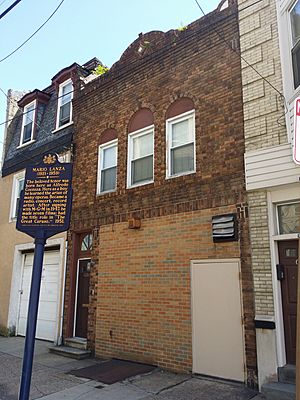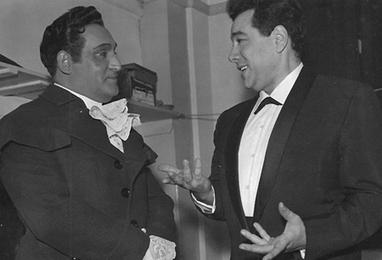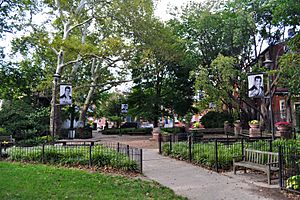Mario Lanza facts for kids
Quick facts for kids
Mario Lanza
|
|
|---|---|
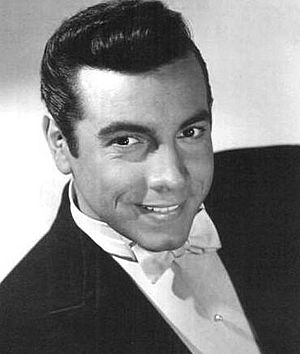
MGM still of Mario Lanza, circa 1950
|
|
| Born |
Alfredo Arnold Cocozza
January 31, 1921 Philadelphia, Pennsylvania, U.S.
|
| Died | October 7, 1959 (aged 38) Rome, Italy
|
| Education | Berkshire Music Center |
| Occupation |
|
| Years active | 1942–1959 |
| Spouse(s) |
Betty Lanza
(m. 1945–1959) |
| Children | 4 |
Mario Lanza (born Alfredo Arnold Cocozza; January 31, 1921 – October 7, 1959) was a famous American singer and actor. He was a big Hollywood film star in the late 1940s and 1950s. Mario Lanza started learning to be a professional singer when he was 16 years old.
After singing at the Hollywood Bowl in 1947, he signed a seven-year movie contract. This was with Louis B. Mayer, the head of Metro-Goldwyn-Mayer (MGM) studios. Mayer was very impressed by Lanza's singing. Before this, Lanza had only sung in two opera performances as an adult. But in 1948, he sang a main role in the opera Madama Butterfly in New Orleans.
His first movie for MGM was That Midnight Kiss (1949). A year later, his song "Be My Love" from the movie The Toast of New Orleans became a huge hit. It sold over a million copies! In 1951, he played his hero, the famous tenor Enrico Caruso, in the movie The Great Caruso. This movie also had a million-selling song, "The Loveliest Night of the Year." The Great Caruso was one of the most popular films that year.
The song from his next movie, Because You're Mine, was his last million-selling hit. This song was even nominated for an Academy Award. Mario Lanza made three more films before he passed away at age 38. At the time of his death in 1959, he was still known as "the most famous tenor in the world."
Contents
Early Life and Talent
Mario Lanza was born Alfredo Arnold Cocozza in Philadelphia. His parents were from Italy, and he heard classical singing from a young age. His mother, Maria Lanza, was from Tocco da Casauria. His father, Antonio Cocozza, was from Filignano.
By the time he was 16, it was clear he had a special singing voice. He started performing in local opera shows in Philadelphia. These were for the YMCA Opera Company. Later, a famous conductor named Serge Koussevitzky noticed him. In 1942, Koussevitzky gave young Cocozza a full scholarship to the Tanglewood Music Center in Massachusetts. Koussevitzky reportedly told him, "Yours is a voice such as is heard once in a hundred years."
Opera Performances
Mario Lanza made his opera debut in 1942. He sang the role of Fenton in the opera The Merry Wives of Windsor. This was at the Berkshire Music Festival in Tanglewood. Around this time, Alfredo Cocozza chose his stage name, Mario Lanza. He picked it because it was similar to his mother's maiden name, Maria Lanza.
Critics praised his performances at Tanglewood. One critic from The New York Times said his voice had "few equals among tenors of the day." Another critic wrote that he would "have no difficulty one day being asked to join the Metropolitan Opera."
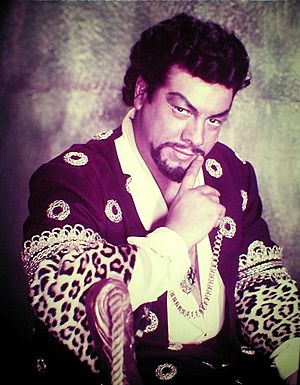
His singing career was paused during World War II. He joined the United States Army Air Corps and performed in shows for soldiers. He also appeared in a movie called Winged Victory. After the war, he started singing again in 1945. He performed with the NBC Symphony Orchestra. He also sang on a popular radio show called Great Moments in Music.
In 1947, he went on a long concert tour across the United States, Canada, and Mexico. He performed 86 concerts with other singers. Critics continued to praise his "superbly natural tenor" voice.
In April 1948, Lanza sang in two performances of Puccini's Madama Butterfly. This was for the New Orleans Opera Association. Critics loved his performance, saying he had an "exceptionally beautiful voice."
At the time of his death, Mario Lanza was planning to return to the opera stage. He was working with a coach and hoped to sing in the opera Pagliacci in Rome. He also had offers to record complete operas.
Hollywood Film Career
A concert at the Hollywood Bowl in August 1947 changed Mario Lanza's life. Louis B. Mayer of Metro-Goldwyn-Mayer (MGM) saw him sing and quickly signed him to a seven-year movie contract. Lanza hoped he could do both movies and opera. In May 1949, he made his first professional recordings. His recording of "Che gelida manina" from the opera La bohème won an award for Operatic Recording of the Year.
Early Film Success
Lanza's first two movies, That Midnight Kiss and The Toast of New Orleans, were very popular. Both films starred Kathryn Grayson alongside him. In 1950, his song "Be My Love" from The Toast of New Orleans became his first of three songs to sell over a million copies. This made him very famous. At MGM, Lanza worked closely with Johnny Green, a talented conductor and composer.
Playing Enrico Caruso
In 1951, Lanza played the famous tenor Enrico Caruso in the movie The Great Caruso. This film was MGM's biggest hit that year. Lanza's performance earned him compliments from Enrico Caruso Jr., Caruso's son.
Challenges and Later Films
In 1952, Lanza was let go by MGM after recording songs for the movie The Student Prince. The main reason given was that his weight made it hard for him to fit into the costumes. However, there was also a disagreement with the director. The movie was later made with another actor, Edmund Purdom, who lip-synced to Lanza's recorded singing voice.
After this, Lanza felt very down. He stayed out of the public eye for over a year.
Lanza returned to movies in 1955 with Serenade. This film had a lot of great music, including songs from famous operas. In 1957, Lanza moved to Rome, Italy. There, he worked on the film Seven Hills of Rome. He also started performing live again. In November 1957, he sang for Queen Elizabeth II in London. From January to April 1958, Lanza went on a concert tour in Europe. He gave 22 concerts and received good reviews for his singing.
In September 1958, he recorded opera songs for his last film, For the First Time. He received offers to sing in operas in Rome and Naples. However, his health was getting worse.
Death
In April 1959, Lanza became ill with heart problems and pneumonia. On October 7, 1959, Mario Lanza passed away at the age of 38. He was survived by his wife and four children. His wife, Betty Lanza, passed away five months later.
Legacy and Influence
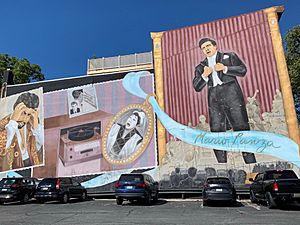
Mario Lanza was the first artist for RCA Victor Red Seal to win a gold record. He was also the first artist to sell two and a half million albums. Some people called him the "new Caruso" because of his quick success in Hollywood. MGM hoped he would become their "singing Clark Gable" due to his good looks and powerful voice.
He was a big inspiration to other singers, including Elvis Presley. A year after Lanza's death, Elvis Presley recorded an English version of "O Sole Mio", a song Lanza had made popular. This song, "It's Now or Never", became one of Elvis's best-selling songs.
Many famous opera singers have said Mario Lanza inspired them. José Carreras said, "If I'm an opera singer, it's thanks to Mario Lanza." Plácido Domingo stated, "Lanza's passion and the way his voice sounds are what made me sing opera." His films, especially The Great Caruso, influenced many future opera stars. These include Joseph Calleja, José Carreras, Plácido Domingo, and Luciano Pavarotti.
Honors and Memorials
A road in Philadelphia, where Lanza was born, is named Mario Lanza Boulevard. The Mario Lanza Institute and Museum is in South Philadelphia. It honors his memory and gives scholarships to young singers. Philadelphia's Queen Street Park was also renamed for Lanza in 1967.
A marker was placed where his birthplace once stood in South Philadelphia. In 1998, he received a Golden Palm Star on the Palm Springs Walk of Stars. Lanza also has two Stars on the Hollywood Walk of Fame for his recordings and motion pictures.
Filmography
| Year | Title | Role | Studio | Notes |
|---|---|---|---|---|
| 1944 | Winged Victory | A chorus member | Twentieth Century-Fox | Uncredited role |
| 1949 | That Midnight Kiss | Johnny Donnetti | Metro-Goldwyn-Mayer | |
| 1950 | The Toast of New Orleans | Pepe Abellard Duvalle | Metro-Goldwyn-Mayer | |
| 1951 | The Great Caruso | Enrico Caruso | Metro-Goldwyn-Mayer | |
| 1952 | Because You're Mine | Renaldo Rossano | Metro-Goldwyn-Mayer | |
| 1954 | The Student Prince | Prince Karl | Metro-Goldwyn-Mayer | Provided the singing voice |
| 1956 | Serenade | Damon Vincenti | Warner Bros. | |
| 1957 | Seven Hills of Rome | Marc Revere | Metro-Goldwyn-Mayer | Also known as Arrivederci Roma |
| 1959 | For the First Time | Tonio Costa | Metro-Goldwyn-Mayer | His final film role |
Popularity in Films
At the peak of his career, Mario Lanza was one of the most popular stars.
- 1951 – 13th most popular in the US, 10th in the UK
- 1952 – 23rd most popular in the US, 6th in the UK
Music Albums (CDs)
- The Great Caruso And Other Caruso Favorites (1989)
- Mario Lanza Sings Songs from The Student Prince and The Desert Song (1989)
- Mario! (Lanza At His Best) (1995)
- Mario Lanza: Opera Arias and Duets, (1999)
- Mario Lanza Live at Hollywood Bowl: Historical Recordings (1947 & 1951) (2000)
Images for kids
-
From the film Toast of New Orleans, as Lt. Pinkerton USN, in recreation of the opera Madama Butterfly
See also
 In Spanish: Mario Lanza para niños
In Spanish: Mario Lanza para niños
 | Kyle Baker |
 | Joseph Yoakum |
 | Laura Wheeler Waring |
 | Henry Ossawa Tanner |


